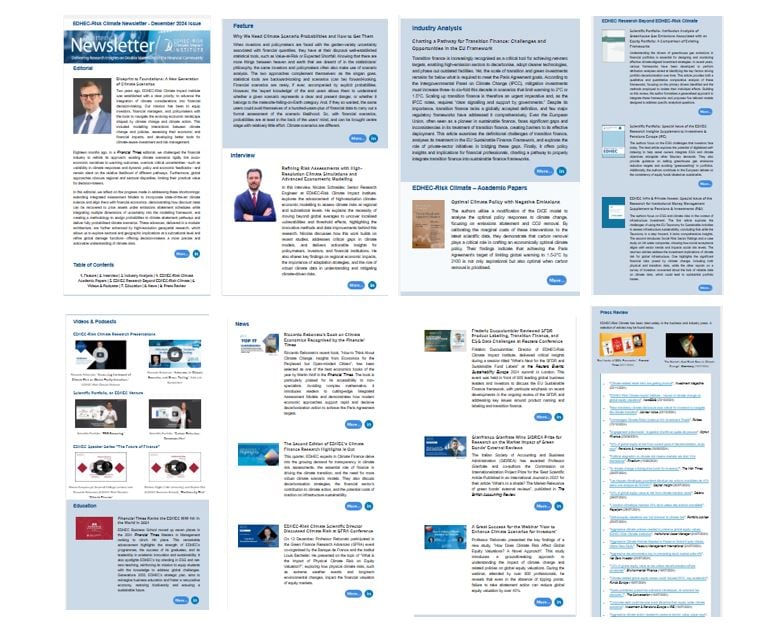
EDHEC-Risk Climate December 2024 Newsletter is out!
Written on 20 Dec 2024.

We are delighted to present our December 2024 newsletter, featuring reflections on the evolution of climate scenarios and advancements in integrating state-of-the-art climate science with financial economics, including high-resolution geospatial research for localized insights. This issue also explores the importance of probabilistic climate scenarios to address critical uncertainties, insights into advancing high-resolution climate-economic modeling and localized risk assessments, and an analysis of the challenges and opportunities in scaling transition finance within the EU framework.
Frédéric Ducoulombier, Director of EDHEC-Risk Climate, opens the editorial, with an article entitled "Blueprint to Foundations: A New Generation of Climate Scenarios". He reflects on the institute's mission to integrate climate considerations into financial decision-making, equipping investors, financial managers, and policymakers with tools to navigate the economic impacts of climate change and climate action. The article highlights significant progress in addressing the limitations of traditional climate scenarios, including rigid socio-economic and warming linkages, overlooked uncertainties, and the lack of probabilities for different pathways. Frédéric emphasizes advancements in modeling frameworks that incorporate cutting-edge climate science, align with financial economics, and deliver actionable insights through high-resolution geospatial research. This editorial reaffirms EDHEC-Risk Climate’s dedication to developing innovative tools and methodologies that empower decision-makers to manage climate risks and implement effective, climate-aware strategies.
Our feature “Why We Need Climate-Scenario Probabilities and How to Get Them” highlights the urgent need for incorporating probabilities into climate scenarios to better inform investment and policy decisions. The research introduces two innovative approaches for addressing the uncertainties surrounding climate policy and economic outcomes: the maximum-entropy method and a curated expert-opinion approach. These methodologies offer a framework to estimate probabilities for abatement policies and their economic impacts, enabling a more actionable understanding of climate risks. Rebonato’s findings emphasize the alarming probability of surpassing dangerous temperature thresholds by the end of the century, with only minimal chances of achieving safe climate targets. His analysis underscores the significant implications of insufficient climate action on asset valuations, as well as the necessity of integrating probabilistic insights into financial models and policy strategies.
In the interview “Refining Risk Assessments with High-Resolution Climate Simulations and Advanced Econometric Modelling”, Senior Research Engineer and Macroeconomist Nicolas Schneider discusses advancements in high-resolution climate-economic modeling to assess regional and subnational climate risks. He highlights the importance of moving beyond global averages to uncover localized vulnerabilities and non-linear effects, showcasing innovative methods and data improvements. He explains how this work addresses critical gaps in climate models and provides actionable insights for policymakers, investors, and financial institutions. Key findings include the economic impacts of regional climate risks, the importance of adaptation strategies, and the role of robust climate projections in enhancing temporal and spatial understanding for better investment decisions.
The newsletter includes an Industry Analysis article "Charting a Pathway for Transition Finance – Challenges and Opportunities in the EU Framework" exploring the challenges of transition finance, including the definitional ambiguities, gaps in the EU Sustainable Finance Framework, and the critical monetary and fiscal hurdles to scaling investments required to meet IPCC mitigation targets.
Additionally, it provides information on EDHEC-Risk Climate’s latest research publications, events, videos and news, and also includes a press review.
This edition also features selected sustainability publications by Scientific Portfolio, EDHEC Infra & Private Assets Research Institute and EDHEC Business School faculty.
Access all articles here EDHEC-Risk Climate Newsletter - December 2024 Issue


